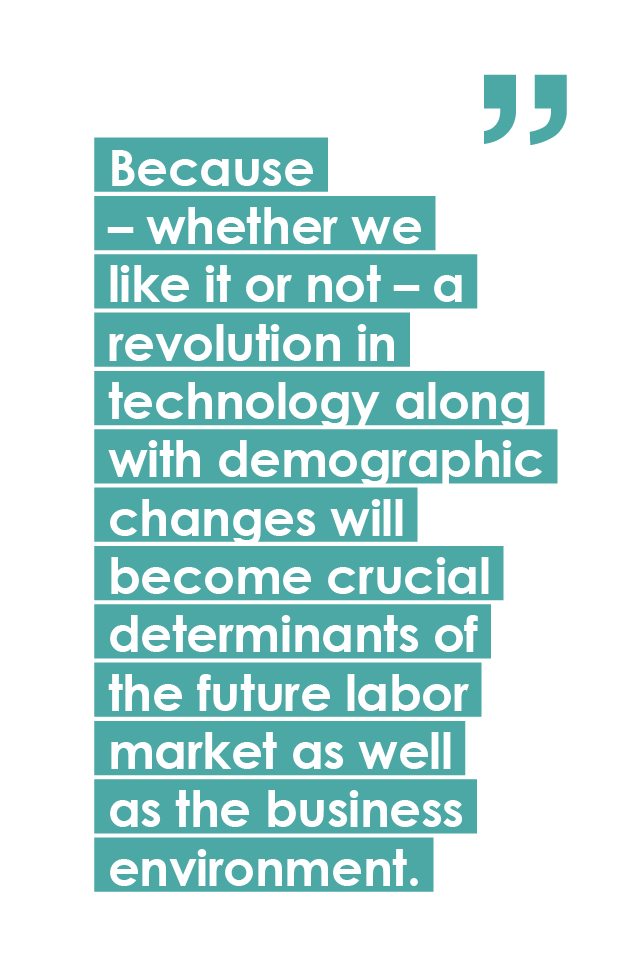European Commission documents state that 37% of Europeans want to be their own boss, but only 10% are. This might be a good starting point to enlarge the family of over 20 million small and medium-sized enterprises (SMEs) in Europe. It is schools and other educational entities that can significantly contribute to achieve this vision via entrepreneurship education.
Entrepreneurship skills are not only something needed by future businessman. It is not only about the ability to establish your own company. In broad terms, there is a set of skills, such as creativity, collaboration, communication, critical thinking, etc., which are also very useful in real, everyday life for everyone, not only for entrepreneurs.
Because – whether we like it or not – a revolution in technology along with demographic changes will become crucial determinants of the future labor market as well as the business environment.
That is why entrepreneurship education has long been a part of the school system in several “clever” countries, such as Finland, Estonia, and Singapore. These countries also top the PISA results. In Slovakia, unfortunately, this agenda seems to be taboo, rather than a subject of a broad discussion and further action.
The important role of schools and educators for the future of entrepreneurship is also recognized by the part played by the European Commission (a good example of cross-disciplinary approach) responsible for growth and entrepreneurship. In one of its key documents The Entrepreneurship 2020 Action Plan, the Commission calls on Member States to provide all young people with practical entrepreneurial experience before leaving compulsory education. Not a bad idea, when you take into account that just 28% of Europeans say that their formal education made them interested in becoming an entrepreneur.
In 2018/2019, the Slovak Business Agency undertook a survey at 166 Slovak schools (elementary and secondary), including 487 teachers, 160 directors and 4 706 students.
This survey was a part of SBA’s activities in entrepreneurship education that will lead to a brand-new support scheme for entities dealing with entrepreneurship education. Beneficiaries of this support will be students in kindergartens and students up to university degree. Yes, also kids in kindergartens, as we believe we should start as early as possible with building entrepreneurship skills – the skills necessary for the 21st century. Another group of beneficiaries will be teachers, as they need the right training and first-hand experience of effective teaching. The scheme, of course, counts with the wider cooperation of the business environment, via visits of students to companies.
 But let’s get back to the research. Its objective was to gain the following information: a) how schools prepare their students for the labor market, b) whether schools teach students about entrepreneurship, c) what schools miss in the education process.
But let’s get back to the research. Its objective was to gain the following information: a) how schools prepare their students for the labor market, b) whether schools teach students about entrepreneurship, c) what schools miss in the education process.
The key findings:
- 56% of students see their future career as an employee.
- In terms of skills, 89% of teachers said that they focused on responsibility, this was followed by motivation (87%), communication (81%), cooperation (77%) and endurance (74%). Critical thinking and creativity were in positions 8 (69%) and 9 (68%), although they belong together with cooperation and communication to the four key skills of the future.
- 41% of directors do not find entrepreneurship skills a priority competence of the students.
- 67% of directors consider entrepreneurship education to be teaching about how to draft a business plan and what it means to be an entrepreneur.
- The biggest problem according to teachers (69%) was too much theory and limited time for other activities, such as discussion, brainstorming, etc. Another serious problem raised by 54% of teachers was a lack of educational materials.
These findings were in line with the Commission data mentioned above, and the survey also confirms a European-wide need for change in thinking on entrepreneurship and entrepreneurship skills. The fact that in contrast to Europe, more than 70% of people in China would prefer to be self-employed rather than an employee means there is an acute need for change.



Follow us